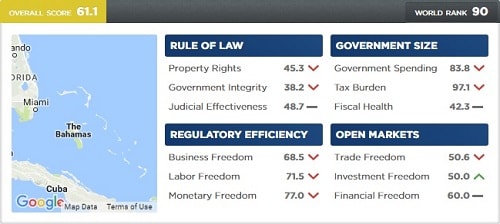Last week, the much-hyped, multi-day “Fyre Festival” in the Bahamas was cancelled amid chaos on the Bahama Island of Great Exuma. While much has been written on the shocking incompetence of Fyre’s event planners that charged patrons exorbitant ticket prices to be stranded on an island with little food, water, shelter, or electricity, less has been said about the other culprit behind this disaster: Bahamas’ Big Government.
To be clear, the lion’s share of blame obviously falls on the music festival’s organizers. It takes a special kind of nerve to charge people thousands of dollars to stay in “island villas,” which were later advertised as a “modern, eco-friendly, geodesic domes,” and turned out to be leftover FEMA disaster-relief tents from Hurricane Matthew. The “gourmet food” also underwhelmed (when there was food available), and performers and vendors claim they weren’t paid.
But despite Fyre organizers’ gross mismanagement, this event would not have been as legendary of a fiasco if not for the Bahamian government.
As the Heritage Foundation shows us in its 2017 Index of Economic Freedom, the Bahamas is a nation impoverished by its own lack of economic opportunity. Out of 180 countries the index ranks, the Bahamas placed 90th for economic freedom (narrowly besting Uganda and Bosnia) with a score of 61 percent.
Of particular note, the Bahamas was ranked “repressed” in the categories of trade freedom and investment freedom, and “mostly unfree” on business and financial freedoms.
The scope of the problems awaiting visitors to the Fyre Festival was compounded by the relative scarcity found throughout the Bahama islands.
While event planners were extraordinarily negligent in their inability to provide enough food and water for attendees, in a free economy, one would expect that an island with 7,000 full-time residents, as well as numerous resorts, would have had many places to purchase food and drinks. A free-market island of this size would easily be capable of rapidly mobilizing resources to accommodate a bunch of stranded millennials.
This was not the case here.
Numerous sources have reported on the food and water shortages in the FEMA tent city and, later, at the Great Exuma airport where multiple people passed out due to the heat and dehydration.
Transportation on the island was also scarce, as festival-goers had a difficult time finding a cab, or were transported on old school buses.
The lack of resources found on Great Exuma, and in much of the Bahamas, is the result of bad economic policy. As RealClearMarkets editor John Tamny has repeatedly noted, “there are no jobs without investment.” The Bahamas’ status as a “repressed” nation for investment is largely to blame for its four consecutive years of zero economic growth and 14 percent unemployment rate.
And unfortunately, the Heritage Foundation is pessimistic on the prospects for change:
There is little momentum for economic reform in the Bahamas, which appears gradually to be losing competitiveness vis-à-vis other nations that are moving more rapidly to expand economic opportunity. The emergence of a more dynamic and sustainable private sector is held back by the weak rule of law, lingering protectionism, and bureaucracy that undermines the investment environment.
As the Bahamian government works to revamp its image as a tourist destination following this high-profile disaster, instead of turning to a slick marketing campaign, they should pass reforms that will lead to greater abundance, freedom, and opportunity. As a prior tourist who loves this island chain and its beautiful beaches, I’ll be rooting for their success. Bahamas, let’s fyre up that economy!
Photo credit: Screenshot via YouTube



